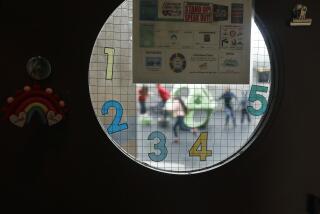California becomes first state in the country to push back school start times

- Share via
SACRAMENTO — California will become the first state in the nation to mandate later start times at most middle schools and high schools under legislation signed into law by Gov. Gavin Newsom on Sunday, a proposal designed to improve educational outcomes by giving students more sleep.
The new law, however, is not without controversy. It was opposed by some school officials and rejected twice before by lawmakers and Newsom’s predecessor.
“The science shows that teenage students who start their day later increase their academic performance, attendance, and overall health,” Newsom said in a statement. “Importantly, the law allows three years for schools and school districts to plan and implement these changes.”
The law will take effect over a phased-in period, ultimately requiring public middle schools to begin classes at 8 a.m. or later while high schools will start no earlier than 8:30 a.m. The law does not apply to optional early classes, known as “zero periods,” or to schools in some of the state’s rural districts.
Although school schedules vary, a legislative analysis in July said that roughly half the schools in the state would be required to delay their start times by 30 minutes or less to comply with the law. An analysis of the 2011-12 school year by the Centers for Disease Control and Prevention found the average start time for California schools attended by some 3 million middle school and high school students was 8:07 a.m. Some of the state’s students were required to be in class before 7:30 a.m.
The new start times will be implemented by the beginning of the 2022-23 school year or when a school’s three-year collective bargaining agreement with its employees comes to an end, whichever is later. Schools that have recently negotiated agreements or are in the midst of negotiating new agreements with teachers have the option of adjusting to the later times when their contracts end.
In advocating for SB 328, state Sen. Anthony Portantino (D-La Cañada Flintridge), author of the legislation, cited a 2014 opinion from the American Academy of Pediatrics that said middle and high schools in most districts should not start school until 8:30 a.m.
“Today, Gov. Newsom displayed a heartwarming and discerning understanding of the importance of objective research and exercised strong leadership as he put our children’s health and welfare ahead of institutional bureaucracy resistant to change,” Portantino said. “Generations of children will come to appreciate this historic day and our governor for taking bold action. Our children face a public health crisis. Shifting to a later start time will improve academic performance and save lives because it helps our children be healthier.”
The question of whether to push back school start times has lingered for years across the nation, hotly debated by academics and health professionals. The American Academy of Pediatrics, which backed the proposal along with groups such as the California Medical Assn. and the California State Parent Teacher Assn., pointed to studies that found links between more sleep from later start times and better school performance, and better health, among adolescents.
The pediatricians’ group says it “recognizes insufficient sleep in adolescents as a public health issue, endorses the scientific rationale for later school start times, and acknowledges the potential benefits to students with regard to physical and mental health, safety and academic achievement.”
“Teenagers in this country are sleep deprived,” said Assemblyman Todd Gloria (D-San Diego) before the Assembly approved the bill with a 44-17 vote last month. “It is a public health epidemic, and according to conclusive medical research, the primary cause of this epidemic is the early school start times that are not aligned with biological sleep needs of adolescent children.”
The American Academy of Pediatrics also called for more research to document the effects of later start times and advised that average commutes in a community and other local factors should also be considered — a key argument made by the California School Boards Assn., the California Teachers Assn. and other opponents of the bill.
Teachers unions and school districts generally argued that decisions about the appropriate time to begin classes should be determined at the local level, allowing districts and schools to determine schedules that best meet the needs of their communities.
“We should not set the bell schedule from Sacramento,” said Assemblyman Patrick O’Donnell (D-Long Beach), a former schoolteacher and chairman of the Assembly Education Committee. “Sacramento does not know best.”
Opponents also pointed out the change could affect bus routes and result in higher district costs. They also said it could prevent parents from dropping their kids off at school before work and push extracurricular activities further into the evening.
The California Teachers Assn. called Newsom’s decision to sign the bill “unfortunate,” saying it creates significant challenges that will ultimately affect students.
“SB 328 could have a disproportionately negative impact on working families, particularly laborers and service industry employees who don’t have the option of starting their workday later,” said Claudia Briggs, a CTA spokeswoman. “We know from experience that many of these parents will drop their children off at school at the same time they do now, regardless of whether there is supervision, and there is not enough funding from the state for before school programs to ensure the safety of students who will be dropped off early.”
Former Gov. Jerry Brown rejected similar legislation last year, which he criticized in his veto message as a “one-size-fits-all approach” that should instead be left up to the local districts. In 2017, the bill fell short on the Assembly floor.
Newsom’s signature on the bill came on the last day for him to act on legislation sent to his desk by lawmakers before they adjourned for the year.
More to Read
Sign up for Essential California
The most important California stories and recommendations in your inbox every morning.
You may occasionally receive promotional content from the Los Angeles Times.











